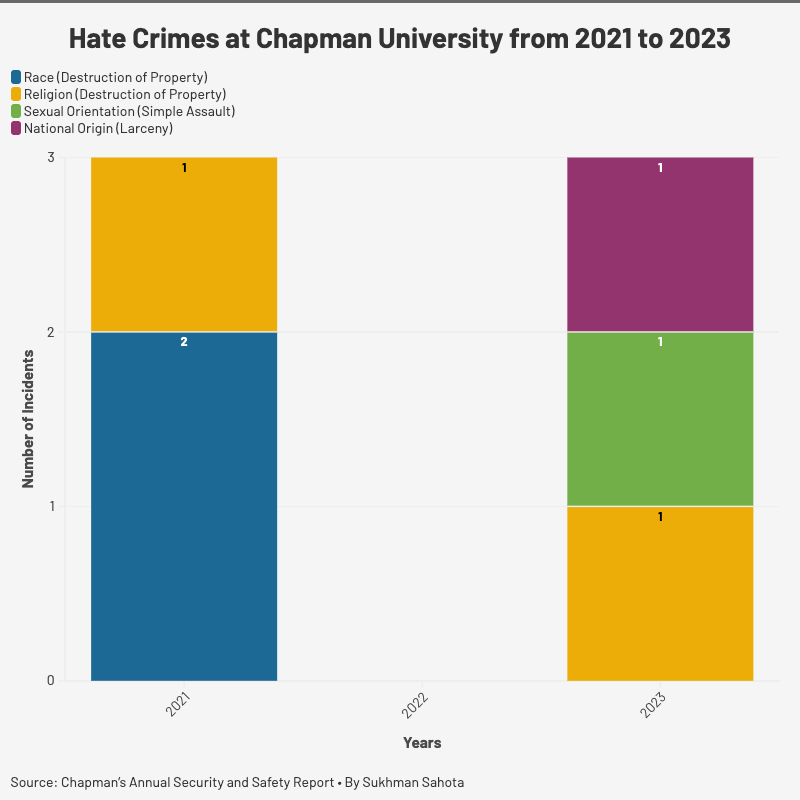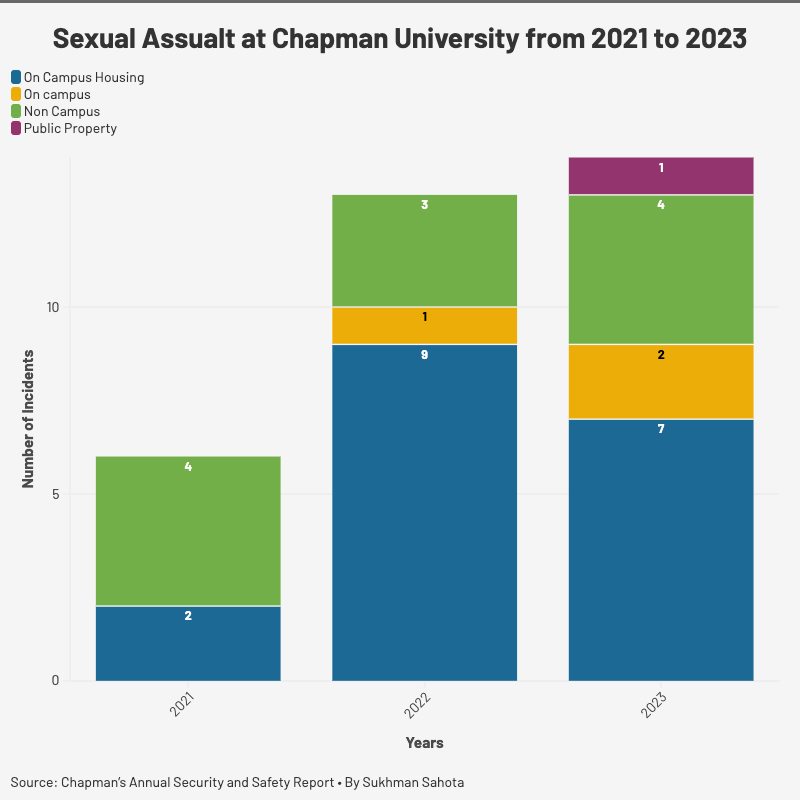Chapman’s Annual Safety Report depicts drug law violations, vehicle theft and sexual assault cases
Chapman’s Annual Security and Safety Report for 2024 reveals a rise in crimes during the years 2022 and 2023, especially when it comes to motor vehicle theft and sexual assault, but it also saw a decline in drug law violations. However, according to Rick Gonzalez, the Chief of Public Safety, this can be attributed to the impact of COVID-19 on student activity on campus and residence life.
The Department of Public Safety publishes this report in collaboration with the Dean of Students Office and Human Resource Department and it shows the statistics for crimes and fires on the Orange and Rinker campuses from 2021 to 2023.
The Fire and Safety report depicted a total of nine motor vehicle thefts, with two happening in 2021, three in 2022 and four in 2023. However, according to Gonzalez, those numbers can be deceiving, due to the fact that they must include golf carts and electric scooters in the definition of vehicles. In reality, only three cars were stolen in 2023.
“One of (the) trends that we saw was that most of the vehicle burglaries included unlocked vehicles with property left in plain view,” explained Gonzalez. “We recently started a new campaign called Take, Hide, Lock. Take your valuables. Hide your property. Lock your vehicle. We will be placing posters and flyers all around campus.”
Graphs by Sukhman Sahota
The report saw a total of 90 drug law violations, with 35 happening in 2021, 29 in 2022 and 26 in 2023. This refers to any time there was a violation of federal, state, or local law regarding the unlawful possession, sale, or consumption of drugs, which includes cocaine, opium, synthetic narcotics, dangerous non-narcotic drugs and marijuana.
“Ever since they decriminalized marijuana in California, it has been very easy to obtain. The numbers are deceiving because one incident could have three referrals,” said Gonzalez. “These numbers will always fluctuate depending on enrollment and the number of students in res life, this also applies to the rates for liquor offenses.”
Chapman University also prohibits the unlawful possession, use and/or distribution of unlawful substances or alcohol. In the Fire & Safety Report, Chapman saw a total of 46 alcohol law violations, with 16 happening in 2023, 18 in 2022 and 12 in 2021.
Graphs by Sukhman Sahota
According to the Fire and Safety Report, there were a total of six hate crimes at Chapman, three in 2021 and three in 2023. In 2021 the hate crimes that happened were one related to race and two to religion. In 2023 it was one related to national origin, one to sexual orientation and one to religion. People in the Chapman community can use the Cross-Cultural Education and Resource Team (CERT) reporting form to report any bias-related incidents, hate or discrimination, but students are encouraged to contact Public Safety and the local authorities.
CERT also provides preventative education about the impacts of bias and hate.
“(Educational programs) play a crucial role in preventing hate crimes. Last semester we did a lot of preventative education with several student groups by informing them what constitutes a hate crime and how to report it. Investigating hate crimes may prevent further hate crimes from occurring.”
Graphs by Sukhman Sahota
The Fire and Safety Report also includes statistics on the rates of sexual assault that were reported since 2021. This includes any offense that meets the definition of rape, fondling, statutory rape or incest per the FBI’s Uniform Crime Reporting program, which defines it as any sexual act that is directed at another person without their consent, including when they are not capable of giving consent.
Chapman saw 12 cases of fondling between 2021 and 2023. Fondling refers to the touching of private body parts of another person for sexual gratification without consent. This can mean either forcible fondling or not forcibly in cases where the victim is not able to give consent due to age or mental or physical incapacity, whether that be temporary or permanent.
“If a student is somehow impacted or affected by any type of interpersonal violence, it can be stalking, it can be sexual assault itself, I hope that I get contacted,” said Dani Smith, who is the sexual assault crisis counselor. “If students come to me, I explain the process to them, I explain their options to them in a safe, confidential and privileged space as long as they’re of age and there aren't any other potential reasons why it can’t be privileged.”
There was also a total of 18 rapes during that same period, with four happening in 2021, eight in 2022 and six in 2023. Ten of those instances occurred in on-campus housing, while the remaining eight happened in non-campus property. This can apply to any property owned or controlled by a student organization that is recognized by the institution, or any property from an institution that is used directly related to Chapman’s educational purposes, is used frequently by students and is not within the reasonably contiguous geographic area, meaning not within one mile from campus or separated by a highway or river.
“If they want to go down to the Title IX office they can go by themselves or we will go with them and I say that to students,” explained Smith. “I’ll go with them and meet them at the police station if they want to file a police report. I’ll do all of those things, I’ll do none of those things other than listen to them because it’s really about giving the student back the power that was ripped or taken from them during the assault or the abuse.”
Chapman has many programs year-round both to prevent and to support victims of sexual assault. From bigger on-campus events, like the Clothesline Project, Take Back the Night and Chapman Walk Against Violence, to Active Bystander Intervention training, educational content in the Beckman lobby and in Argyros Forum, resources in the C.A.R.E.S. website, safety whistles and the panther guardian. Additionally, Resident Advisors are trained by Smith to know how to report sexual assault and what resources are available so they know where to send students.
“I’m here with an open door, just wanting to help you all stay safe,” said Smith. “And then get you connected to the right people, the right resources on our campus: counseling services, the Title IX office, or anything else) they might need.”
The Fire & Safety Report also includes a list of many methods and programs the Department of Public Safety has to help educate the Chapman community and arm them with strategies to enhance their personal safety. These programs are offered throughout the year and include Rape Aggression Defense (R.A.D.), Operation Safe Ride, Operation “Get Safe” Video, Bi-TAP (Bicycle Theft Avoidance Program), Panther Guardian Safety App and many others.
“Most people focus on the statistics. There are a lot of great resources and information in the report. The report demonstrates our institutional commitment to maintaining a safe and healthy environment,” said Gonzalez. “I would like to highlight our free self-defense courses which also include tips to improve situational awareness. Additionally, I highly encourage students to use our Safe Ride program.”
The report follows the guidelines of the Jeanne Clery Disclosure of Campus Security Policy and Campus Crime Statistics Act of 1998, which require any university that receives federal funds to release an annual security report to the public. According to those guidelines, the report should include campus crime statistics from the three previous years and the plans for improving safety measures on campus.



